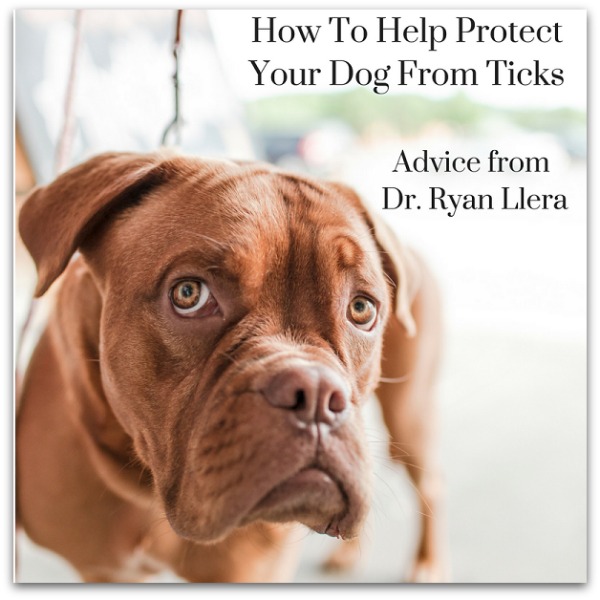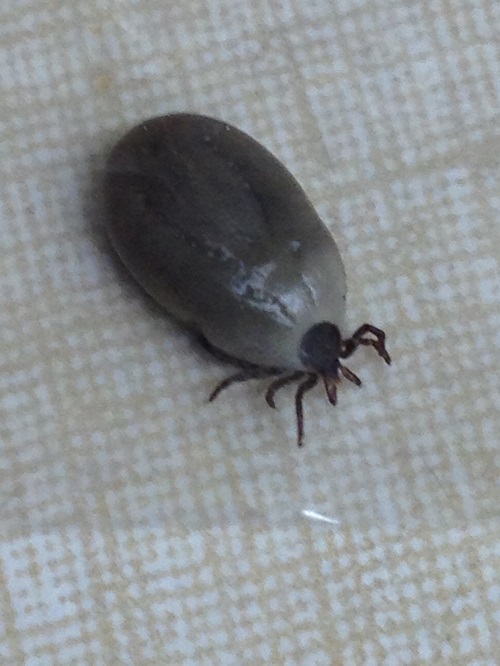
You may remember Dr. Ryan Llera from his last guest post on Canadian Blog House where he provided some advice about homemade pet safe treats.
How To Help Protect Your Dogs From Ticks
Dr. Llera is back and ready to help us, and our dogs, face tick season. He’s got some great advice on how to protect your dog from ticks.
We may still have snow on the ground in many parts of Canada but, the temperatures will soon start to rise, melting that snow, and bringing out those despicable ticks.
It only takes temperatures to rise above 4 degrees in order for ticks to start seeking out their prey – our dogs…and us!
After reading Dr. Llera’s advice on how to protect your dog from ticks, I will be contacting Bella and Guinness’ veterinarian this month to get them started on spring tick prevention!
Thanks to Dr. Llera for sharing his expertise with us!
Attack Of The Ticks!

They’re here!!! Yes, ticks can be as scary as the 80s horror movie “Poltergeist”. There’s even a horror film called “Ticks” which is described as: “A group of troubled teenagers are led by social workers on a California wilderness retreat, not knowing that the woods they are camping in have become infested by mutated, blood-sucking ticks.” Why is this important? Because the threat of ticks is real!
Ontario Is A Hotbed For Ticks
Ontario has become a hotbed of activity for ticks in the past few years and both people and pets are potentially paying for it. I find it surprising that the human medical community is just latching onto the idea of Lyme disease being a problem now whereas the veterinary field has known about the threat for years. We even have a really good test, that we do often, to check for it in your dog but the same cannot be said for the human medical field with the human medical community preferring to diagnose based off of clinical signs.
When Temperatures Rise, So Do Ticks
But getting back to your pets…. If you’ve got a dog, listen up. I can help you help protect your dog from ticks. If you’ve got a cat, take some comfort in knowing that Lyme disease is not a condition we see in the feline species. The tick culprit is the Ixodes tick, or better known as the deer or black-legged tick. And they don’t jump from trees or bushes to attack your dog but go through a process called questing where they hang on to taller grasses just waiting for you and your pet to walk by. And winter time doesn’t kill off the ticks necessarily, as they can hibernate underneath leaves and brush. Once the springtime temperatures get above 4 C, those ticks will start questing.
Sometimes you may not even be aware if your pet gets bitten by a tick, particularly with thicker or shaggy-coated dogs. How can you be sure your pet wasn’t bitten by a tick? Sometimes you can’t. More simply, your veterinarian can do a quick blood test that will let you know if your pet is positive or negative for Lyme but also checks for two other tick borne diseases (Ehrlichia & Anaplasmosis) and heartworm disease. Ticks can hide in small, warm spaces (armpits, between toes, in ears) that you may not find them and once they’ve had their fill, they will let go and carry on with their lives.
Seek Veterinarian Advice
Admittedly, removing ticks can be a pain figuratively, but also literally if you break off the head. An embedded tick head can cause inflammation. Removing the ticks properly as soon as you find them can go a long way to keeping your dog safe from nasty diseases. Your veterinarian can show you how and maybe even be able to provide a tool called a Tick Twister (tweezers are generally not recommended). But you can do better! There is a Lyme vaccination as well as more than a few options of prevention available from your veterinarian that are safe, effective, and affordable.
So when it comes to these nasty bugs and the risk of Lyme disease, let’s try to take a proactive approach to keeping you and your pet safe from harm. Don’t hesitate to contact your veterinarian with additional questions or if you think your pet has a tick and you just want some help getting rid of the bugs. Are you ready to help limit the spread of Lyme disease?
 Dr. Ryan Llera is a small animal veterinarian at the Kingston Veterinary Clinic in Kingston, Ontario. Though originally from Florida, he married a Canadian (who is also a vet!) and they share their home with 3 cats, 2 dogs, 2 horses, and a rabbit. Ryan is also a regular guest writer for the Ontario SPCA blog. You can find more of his writing at www.drryanllera.com or see what else he is up to on Facebook, Instagram, and Pinterest.
Dr. Ryan Llera is a small animal veterinarian at the Kingston Veterinary Clinic in Kingston, Ontario. Though originally from Florida, he married a Canadian (who is also a vet!) and they share their home with 3 cats, 2 dogs, 2 horses, and a rabbit. Ryan is also a regular guest writer for the Ontario SPCA blog. You can find more of his writing at www.drryanllera.com or see what else he is up to on Facebook, Instagram, and Pinterest.
